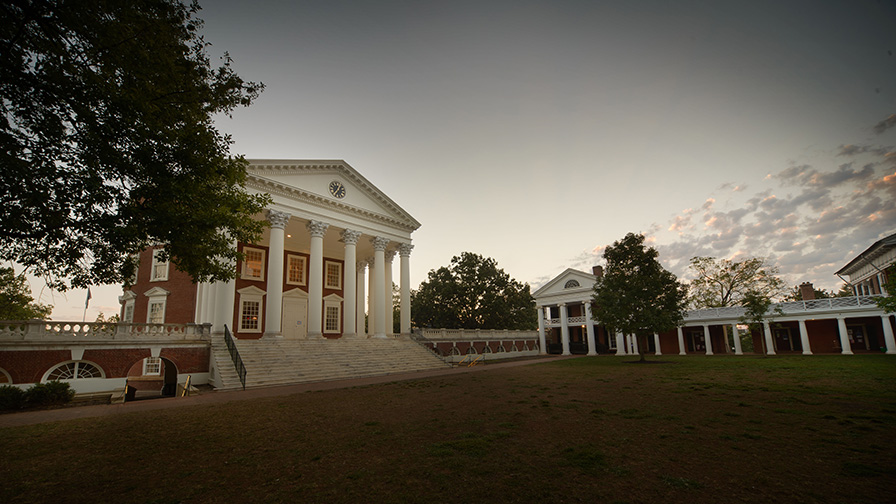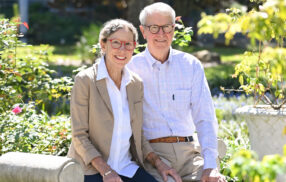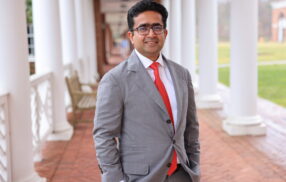
Top Leaders, Students Discuss Global Challenges in Second Year of UVA Tri-Sector Leadership Fellows Program
By Laura Hennessey Martens
Cross-sector leadership means being able to predict how those from other disciplines will approach a problem, understanding why they approach it that way, and being able to inform strategic decisions with knowledge of those other disciplines, according to Morgan Lingar, a graduate student fellow participating in the University of Virginia Tri-Sector Leadership Fellows (TSL) program.
The TSL program recently concluded its second year, offering graduate student fellows like Lingar a deep examination of the growing need for multi-sector collaboration. This year, the program brought eight high-level guest speakers from the fields of business, government, nonprofit and education to the University for a series of dialogues with students exploring modern challenges facing today’s global leaders.
The distinguished speakers engaged graduate student fellows from the Darden School of Business, Frank Batten School of Leadership and Public Policy and School of Law throughout the year for a series of interactive conversations that spanned public, private and social sector issues. Discussions included topics such as:
- Bridging the interests of government and the private and social sectors to address international cybersecurity threats.
- Forming public-private partnerships to help rebuild the United States’ failing infrastructure.
- Addressing gaps between health care access and delivery through the Affordable Care Act.
“Not only did we gain insight into how these leaders resolve hard problems by listening to them share their experiences, we were also awarded once-in-a lifetime opportunities to question these leaders about the choices they made during the course of implementing their solutions,” said Nicole Sarrine, a student fellow from the Law School. Allie Delano Bateman, a student from the Batten School, added, “The speakers would pose difficult challenges and questions and ask us to try to answer them.”
Each speaker covered different topics, personal experiences and leadership examples, but common themes emerged throughout the year-long program. Across the board, the leaders discussed the importance of stakeholder engagement and maintaining cross-sector perspectives during decision making, while mentoring the students on responsible leadership.
While Christopher Valentino, director of strategy for the Cyber Division of Northrop Grumman Information Systems, discussed cybersecurity and Frederick W. Werner, group president of design and consulting services at AECOM, explored the challenges of building a 21st century transportation infrastructure, both leaders touched on the importance of leveraging and engaging all experts and stakeholders involved in a strategic decision.
This theme was echoed by Darden Dean Scott Beardsley during his mid-year session with the fellows. During a case study discussion on deregulation of the global telecom industry, he challenged the students to view each issue from the perspective of business representatives, government officials, consumers, workers, unions and other involved interest groups.
“First, you need to figure out, who are all the stakeholders?” said Beardsley. “Next, you need to consider what do all those stakeholders care about?”
Reflecting on discussions with Beardsley and other speakers, Batten student Joshua Ogburn said, “I now have a better a framework for understanding the stakeholders to consider, the various opinions they may hold and strategies for viewing a situation from the perspective of each stakeholder. It is easy to only think of an issue from one’s own perspective, but this exercise helped me realize the benefits of taking a much wider view.”
Franklin Raines, retired chairman and CEO of the Federal National Mortgage Association (Fannie Mae) led a discussion on creating laws and regulations that lead to desired outcomes for each sector, as well as society as a whole, using scenarios such as consumer privacy, pharmaceutical research and data mining by internet companies. Virginia House of Delegates Democratic Leader David Toscano further demonstrated the importance of a cross-sector perspective in policy making while leading a discussion on business and social implications of the Affordable Care Act.
Harriet Tregoning, principal deputy assistant secretary for the Office of Community Planning and Development at the U.S. Department of Housing and Urban Development (HUD) shared how HUD is spurring investment and building more resilient communities through the formation of public-private partnerships.
“As I reflect on the lessons gleaned from our various speakers, the importance of a cross-sector perspective is especially evident and seems to have been the underpinning of each leader’s success,” Darden student Emma Causey (Class of 2016) said.
UNICEF USA President and CEO Caryl Stern highlighted the importance of building strong and diverse leadership teams to spur innovation and problem-solving. Ignacia Moreno, former assistant attorney general for the Environment and Natural Resources Division of the U.S. Department of Justice and current CEO and principal of The iMoreno Group, gave multiple examples of how cross-sector leadership requires a mutual respect for what each party brings to the table.
“At the beginning of the program, our thinking was narrow in the sense that the law students spotted the legal issues, the business students focused on industry concerns and the public policy students pointed out the social problems,” Sarrine said. “But as the program progressed, I found myself no longer putting myself solely in the ‘lawyer’s box’ and instead thinking in a much broader manner that incorporated what I was learning from my colleagues and from our speakers.”
Darden student Cameron Cutro (Class of 2016) noted the wide-ranging, long-term responsibilities of multi-sector leadership. “A strong sense of cross-sector leadership requires being intentional about how you approach relationships and problems and knowing that your actions will define not just you, but potentially your company or entire sector.”
The TSL program is a cross-university initiative that brings together prominent leaders with students and faculty from the university’s Darden School, Batten School and School of Law. Through these interactions, the student fellows gain first-hand insights into how these leaders critically analyze complex decisions, including those that cross financial, ethical, economic, political, policy, legal and other spheres.
Now entering its third year, the success of the TSL program can be seen in the increasing demand for its 24 available slots (eight from each school). Applications for the third-year cohort increased more than 40% from the two prior years.
The program is administered by the Darden School’s Institute for Business in Society and facilitated by faculty across the three schools.
The University of Virginia Darden School of Business prepares responsible global leaders through unparalleled transformational learning experiences. Darden’s graduate degree programs (MBA, MSBA and Ph.D.) and Executive Education & Lifelong Learning programs offered by the Darden School Foundation set the stage for a lifetime of career advancement and impact. Darden’s top-ranked faculty, renowned for teaching excellence, inspires and shapes modern business leadership worldwide through research, thought leadership and business publishing. Darden has Grounds in Charlottesville, Virginia, and the Washington, D.C., area and a global community that includes 18,000 alumni in 90 countries. Darden was established in 1955 at the University of Virginia, a top public university founded by Thomas Jefferson in 1819 in Charlottesville, Virginia.
Press Contact
Molly Mitchell
Associate Director of Content Marketing and Social Media
Darden School of Business
University of Virginia
MitchellM@darden.virginia.edu





